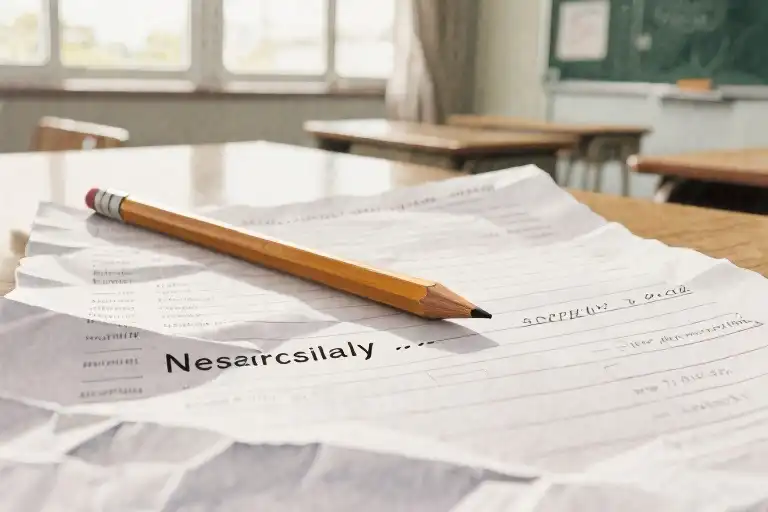The graphite tip of my pencil made a soft scratching sound as it moved across the lined paper, the rhythm syncopated with my heartbeat. That particular Friday, the word ‘necessary’ stared back at me from the chalkboard, its double ‘s’ clearly visible even from my third-row seat. My finger traced the familiar shape in the air – N-E-C-E-S-S-A-R-Y – a word I’d spelled correctly countless times before. Yet when my pencil touched paper, I deliberately omitted one ‘s’, watching the incomplete word take shape with a strange mixture of relief and shame.
Mrs. Srivastava’s starched cotton sari whispered as she paced between our desks, her chappals making soft slapping sounds against the classroom floor. The iron wall clock ticked louder than usual, each second stretching as I contemplated my betrayal – not of the spelling test, but of myself. Three desks away, Priya’s shoulders relaxed visibly when our eyes met during the test, a silent transaction completed: my academic surrender for her renewed friendship.
The scent of steamed rice and turmeric from lunch boxes already permeated the room, though morning recess remained an hour away. My stomach clenched not from hunger, but from the unspoken understanding taking root – that excellence could be lonely, that fitting in sometimes required cutting parts of yourself away. That day, I learned to spell something far more dangerous than vocabulary words: the arithmetic of social survival, where subtraction often felt safer than addition.
Years later, I would recognize this pattern repeating in conference rooms when I bit back innovative ideas, on family Zoom calls where I downplayed promotions, in friendships where I learned to tread carefully around unspoken ceilings. But in that fifth-grade classroom, it simply manifested as a misspelled word and a reclaimed lunch table seat – my first conscious trade of brilliance for belonging, the original sin of self-diminishment that so many of us commit daily without even reaching for our pencils.
The Friday Ritual
The iron timer ticked with metronomic precision, its sound cutting through the classroom’s nervous silence. Every Friday at 10am, the ritual began – twenty words dictated in Mrs. Srivastava’s crisp accent, her jasmine-scented sari brushing against our desks as she paced. The scent always made me think of examinations and erased mistakes.
I remember how my pencil felt those first two weeks – light in my fingers, gliding across the paper with ridiculous ease. ‘Accommodate’ unfolded perfectly. ‘Conscience’ posed no problems. The satisfaction came not from the red star stickers (though those were nice), but from the way my brain’s gears turned smoothly, each letter slotting into place like puzzle pieces I’d handled a thousand times.
Then came the cafeteria shift. Literally. After my second consecutive win, Priya moved her lunchbox three tables down. The scrape of her metal tiffin against the wooden bench echoed louder than any congratulation. ‘You think you’re so smart,’ she’d said, not even looking at me as she walked away. The aloo paratha her mother made suddenly tasted like chalk in my mouth.
What stays with me now isn’t the spelling itself, but the physics of that moment – how success created distance measurable in cafeteria tiles. The way my stomach dropped when I realized victory meant eating alone. How quickly the warmth of achievement cooled into something that left condensation on my skin.
We never discussed the rules, but we all knew them: Excellence was permitted, but not consecutively. Talent could be displayed, but not consistently. Like children playing musical chairs, we understood some chairs must remain empty for the game to continue.
Mrs. Srivastava’s timer would eventually stop, but the real countdown had already begun – the invisible one measuring how long I could stay at the top before the rules of social gravity pulled me back down.
The Third Friday
The graphite tip of my pencil hovered over the lined paper, trembling slightly. Mrs. Srivastava’s sandals made soft clicking sounds as she moved between the rows of desks. The classroom smelled of sharpened pencils and the faint floral perfume she always wore. I knew how to spell ‘necessary’ – had known since third grade – but that Friday, I carefully wrote ‘neccessary’ instead, adding an extra ‘c’ where it didn’t belong.
My palms were damp against the wooden desk, leaving faint smudges on the worksheet. When I intentionally misspelled ‘rhythm’ as ‘rythm’, a drop of sweat fell from my temple, blurring the ‘y’ I’d just written. The clock’s ticking seemed louder than usual, each second marking my small betrayal of myself.
At lunchtime, I found her waiting at our usual table. The tightness in my chest eased when she patted the bench beside her without a word. As I unwrapped my sandwich, I noticed my fingers still smelled of pencil lead and the faint metallic tang of nervous sweat. The victory felt hollow yet necessary – like swallowing medicine you know will help but tastes bitter going down.
That afternoon, walking home with our backpacks bumping between us like always, I understood the unspoken exchange: three misspelled words for restored friendship. My stomach clenched with something that wasn’t quite guilt but wasn’t not guilt either. The math was simple – shrink your brightness to fit their comfort. Fold your wings to walk through their doorways. Make yourself pocket-sized for portable affection.
Years later, I’d recognize that moment in conference rooms when biting back ideas kept the peace, in family gatherings where downplaying achievements maintained harmony. The body remembers these compromises – the way shoulders curve inward slightly, how breath comes shallower when suppressing your full voice. That third Friday taught me early how excellence can isolate, and how often we choose belonging over wholeness.
We carry these lessons in our cells long after the spelling tests end. The particular ache of making yourself less to be loved enough.
Miniature Love
The graphite snapped as I pressed too hard on the spelling test, leaving a smudged ‘neseccary’ on the lined paper. That deliberate mistake in Mrs. Srivastava’s class was just the first of many times I’d learn to fold myself into smaller shapes. Now, twenty years later, I catch myself doing it in conference rooms when I lower my voice after saying something too insightful, or when I laugh a beat too long at a mediocre joke from senior leadership.
We carry these childhood survival strategies into adulthood like well-worn talismans. Three patterns emerge with startling regularity:
- The Vocal Shrinkage – Starting sentences with ‘This might be stupid but…’ before sharing brilliant ideas. Studies show women qualify their speech 47% more often than male colleagues when presenting to mixed-gender groups. The linguistic equivalent of making yourself pocket-sized.
- The Achievement Dimmer – That artful dance of mentioning your promotion only after downplaying the raise, or ‘forgetting’ to mention your published paper until someone directly asks. Like carefully sanding down the edges of your accomplishments so they don’t catch on anyone’s ego.
- The Space Calculus – Physically contracting in meetings (crossed arms, hunched shoulders) or emotionally in relationships (never needing help, never causing ‘drama’). Monitoring your volume, both literal and metaphorical, to maintain just the right level of convenient smallness.
What’s chilling isn’t that we do this – it’s how instinctively it comes. The way my hand still remembers how to misspell ‘rhythm’ all these years later. These behaviors wire themselves into our muscle memory until self-diminishment feels like politeness, until staying small masquerades as being considerate.
In my office building, there’s a vintage elevator with a folding gate that must be manually closed. Every morning, I watch capable professionals automatically make themselves smaller – purses tucked tight, elbows pulled in, breath held – to accommodate others rushing in at the last second. The metaphor writes itself. We’ve been trained to believe love and acceptance come with spatial requirements, that belonging demands we never take up more than our allotted square footage.
Yet here’s the uncomfortable truth no one mentions: people who demand you stay pocket-sized never actually carry you with them. The space they offer is always conditional, temporary. Like my childhood friend who only wanted me beside her when I was precisely three spelling mistakes worth of imperfect.
Somewhere between that elementary school cafeteria and today’s boardrooms, we internalized a terrible math – that being loved means being less. But the equation was flawed from the start. Real connection doesn’t require subtraction.
The Unwritten Rules
The graphite snapped as I pressed too hard on the pencil, leaving a jagged line through my deliberate misspelling of ‘necessary.’ That broken tip mirrored something deeper – the fracture in my understanding of how achievement and belonging coexist. What began as a classroom survival tactic revealed itself as part of a global pattern of social self-limitation.
Across cultures, we’ve developed intricate systems to enforce conformity. In Eastern societies, the ‘nail that sticks up gets hammered down’ proverb shapes behavior from schoolyards to boardrooms. Western workplaces have their own version with ‘Tall Poppy Syndrome,’ where high achievers get subtly trimmed to collective height. These unwritten rules operate with quiet efficiency, passed down through generations like recessive genes for playing small.
I saw it years later during a Tokyo business meeting. A junior executive bowed slightly as she presented revolutionary data, then immediately undercut her findings with ‘but I may be mistaken.’ Her eyes flickered toward her supervisor in the same way mine had scanned the cafeteria that Friday afternoon. The ritual was familiar – the careful calibration of competence to avoid threatening the hierarchy.
Research shows this behavior activates specific neural pathways. When we self-limit, the anterior cingulate cortex – the brain’s conflict monitor – lights up less than when facing direct social rejection. Essentially, our minds prefer the slow burn of self-diminishment over the acute pain of exclusion. We become complicit in our own shrinking, trading pieces of potential for temporary belonging.
Yet the most insidious aspect isn’t the cultural pressure itself, but how thoroughly we internalize it. Like my twelve-year-old self voluntarily misspelling words, adults learn to:
- Lower vocal pitch in meetings to sound less assertive
- Add disclaimers to brilliant ideas (‘This might be stupid but…’)
- Share credit disproportionately for individual achievements
- Avoid visible success markers that might trigger jealousy
These behaviors cross gender and cultural lines, though studies confirm women and minority groups face compounded pressures. The common thread remains: we alter ourselves not just in response to actual criticism, but in anticipation of potential social costs.
Perhaps the real question isn’t why we follow these unwritten rules, but why they exist at all. Evolutionary psychologists suggest group cohesion once trumped individual excellence for survival. Yet in our modern world of innovation and idea economies, this ancient wiring creates constant tension between standing out and fitting in – between the selves we could become and the pocket-sized versions others seem to prefer.
My childhood spelling test sits preserved in memory’s amber, not as regret but as revelation. That moment contained all the subsequent times I’d make myself smaller for love, for approval, for temporary safety. The rules may be unwritten, but their impact leaves visible marks – not on paper this time, but on lives compressed well below their natural dimensions.
The Unwritten Rules
The graphite snapped as I pressed too hard on the third ‘s’ in ‘necessary,’ leaving the word incomplete. That deliberate mistake followed two others – a silent rebellion against my own capability. At ten years old, I’d already internalized the first rule of social survival: excellence has consequences.
We inherit these rules like recessive genes, passed down through playground whispers and workplace corridors. In Tokyo offices, junior employees learn to wait three beats before contributing ideas. London boardrooms teach women to frame suggestions as questions. Silicon Valley engineers discover their technical brilliance needs ‘soft skills’ packaging. The manifestations vary, but the core algorithm remains: calculate the acceptable size of your presence, then subtract 20 percent.
Cultural anthropologists trace this to our tribal roots – the evolutionary advantage of group cohesion over individual distinction. Modern psychology identifies it as social comparison theory in action, where people instinctively measure themselves against others, creating invisible ceilings for achievement. The 2018 Harvard study on workplace dynamics found 68% of professionals admitted to ‘self-limiting behaviors’ when outperforming peers.
Yet the most potent enforcement comes not from institutions but from intimate spaces – the folded napkin in a family kitchen where a child learns to hide test scores, the coffee date where a friend’s smile tightens at career news, the marital bed where one partner’s growth becomes the other’s discomfort. These micro-adjustments accumulate into what therapists call ‘chronic self-contraction,’ the gradual reshaping of a personality to fit the emotional needs of others.
Eastern cultures have the ‘nail that sticks up gets hammered down’ proverb. Australians call it tall poppy syndrome. The Swedes say ‘lagom’ – not too much, not too little. The packaging differs, but the contents share the same bitter taste of withheld potential. We become experts at this emotional origami, folding parts of ourselves into smaller, more palatable shapes.
Perhaps the real question isn’t why we do this, but why we keep doing it long after the playground years. The answer might lie in our neural wiring – fMRI studies show social rejection activates the same brain regions as physical pain. Our biology conspires with our social conditioning, making self-diminishment feel like self-preservation.
In my desk drawer that year, beneath pencil cases and sticker collections, a crumpled spelling test slowly flattened itself out. The red ink bled through the back of the paper where I’d crushed it in my fist, three deliberate mistakes circled like badges of belonging. Two decades later, I can still feel the texture of that paper between my fingers – the raised ridges where my eraser had been too aggressive, the waxy sheen of dried tears. We carry these artifacts longer than we expect, these receipts for the pieces of ourselves we’ve left unclaimed.
Who in your life makes you feel safest when you’re pocket-sized? And what might happen if you stopped folding yourself to fit?





